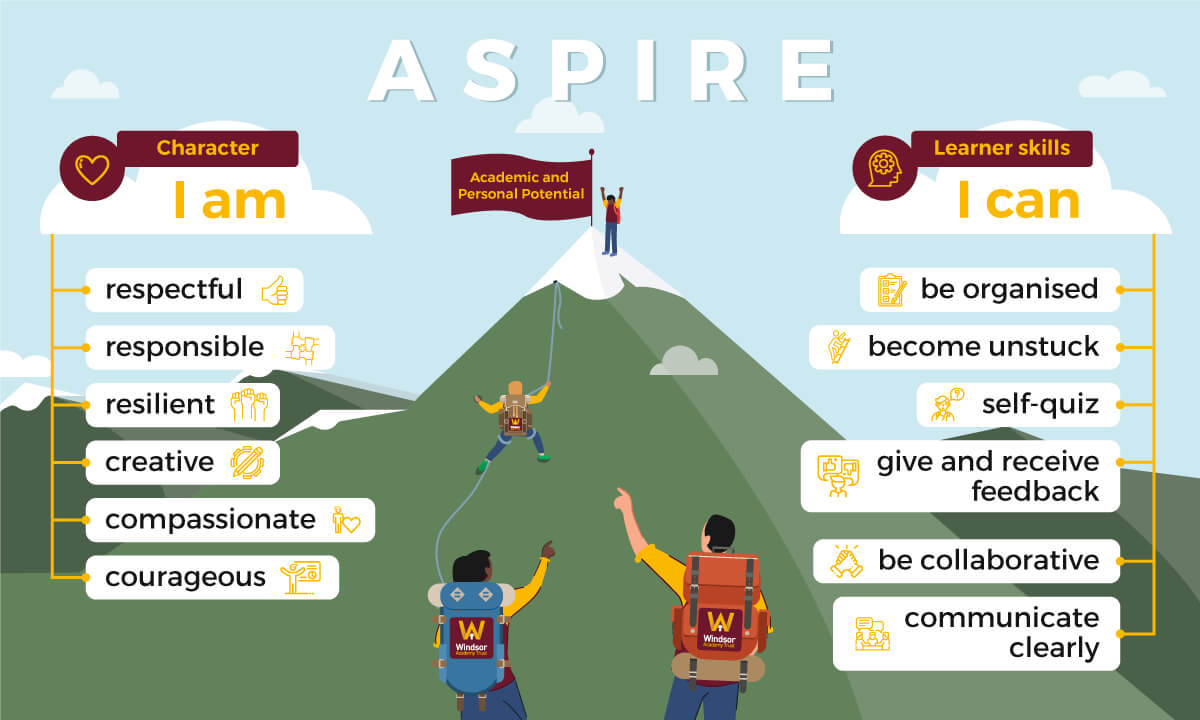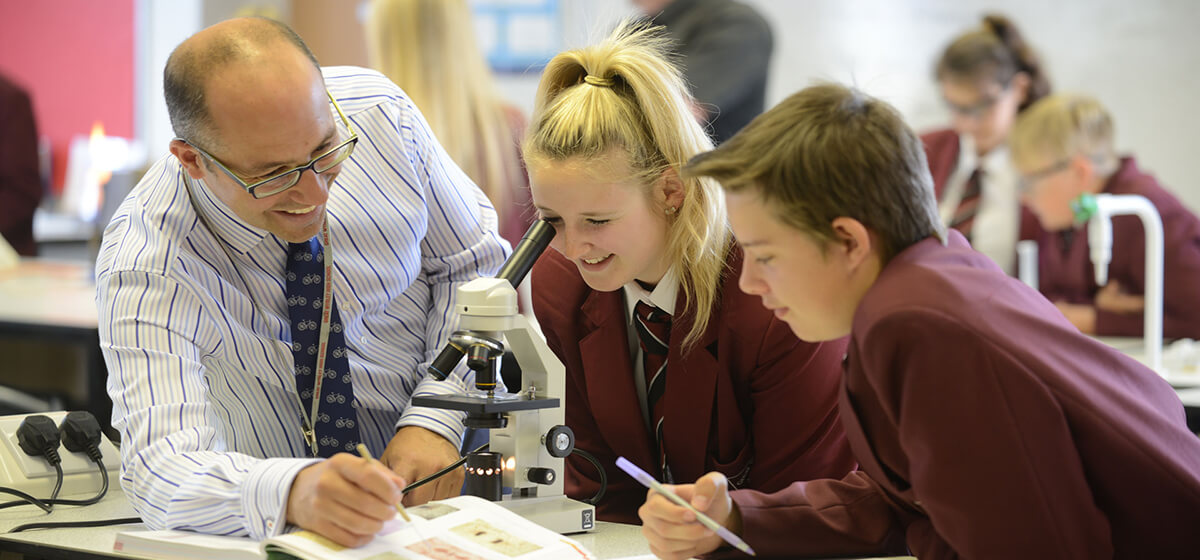Weaving ASPIRE into Teaching and Learning
14th May 2021 – Tags: ASPIRE, Teaching and Learning
By Sonya Lanckham, Strategic Leader - Teaching and Learning, Windsor Academy Trust

As a Trust family, we want every learner to believe that they can be all and more than they ever thought they could be; and know what their future self looks like when they have realised their academic and personal potential.
Students need to see what the view from the top of their personal mountain looks like. Research tells us that people who have clear aspirations for their future (personally and academically) are eight times more likely to be motivated and engaged in their learning in the present (Quaglia Institute for Student Aspirations).
We know from the pandemic that the students who thrived in the remote environment were able to self-regulate. By this, we mean they were able to take responsibility for their learning and they knew what to do when they didn’t know what to do.
We want all our young people to be able to ASPIRE so that they can self-regulate, thrive and be equipped to bounce back from failure In the words of John Hattie, “self-regulation needs to be taught rather than presumed”.
“self-regulation needs to be taught rather than presumed” - Professor John Hattie
Our students have been introduced to the evolved concept of ASPIRE through assemblies and form time. They see it branded everywhere in their schools. They have completed their ASPIRE sentence, which enables them to believe they can unlock their academic and personal potential if they take action in the present.
We are intentionally over-communicating ASPIRE to our students so that it becomes, as Rita Pearson would say, “a part of them”.
As educators, we have the privileged role in guiding our students up the mountain and giving them the ropes of character, powerful knowledge and skills to reach the summit and do so at a faster pace, becoming all and more than they thought they would be.
What is the connection between character, knowledge and learning skills?
All the international research indicates that ASPIRE is best taught within the curriculum. As Michael Young puts it, ‘it is a serious error to assume that skills can be taught independently of knowledge’.
The learning skills test a student’s character. For example, to become unstuck is a test of resilience, or to communicate clearly can be a test of one’s courage. The ASPIRE learning skills and knowledge display a complex interplay as pupils learn. Let’s consider the example below:
‘A student can use planning strategies when drafting a structure for a GCSE essay about Shakespeare. But without an understanding of Shakespeare’s plays, knowledge of language, and the relevant social context, the essay will not be successful.’
Students cannot apply what they don’t know. Knowledge and learning skills support each other and so need to be taught concurrently.
Crucially, learning skills do not stand alone from our curriculum. They should be woven into learning as an intrinsic part of how we upskill students to connect with knowledge at a deeper level.
In a nutshell, the ASPIRE learning skills help students to self-regulate so that they can learn better, learn more deeply and remember more.
What is the evidence base for ASPIRE?
There is extensive international evidence that concludes that character and learning skills are powerful drivers of student progress.
John Hattie’s visible learning research which involved 25 years of looking at the variables that have the greatest impact on student achievement (1600 meta-analyses comprising 96,000 studies involving 300 million students form all over the world) offers strong measures to validate that teaching students to be independent, to be equipped with learning strategies to support them to self-regulate can have an effect size of 0.6 plus.
The EEF’s systematic evidence reviews indicate that metacognitive strategies have large positive impact, on average providing an additional seven months progress.
Dunlosky’s research on study strategies identifies the metacognitive strategies such as practice testing and interleaving as the most powerful strategies for retention of knowledge.
The Jubilee Centre for Character and Virtues identifies four virtue categories: intellectual virtue, moral virtue, civic virtue and performance virtue.
These categories are mutually influential towards an individual’s ability to flourish personally and academically; emphasis must be placed on the application of all, not one. The six ASPIRE Character Virtues embody these four virtue categories.
The EEF makes a definitive link between the mindsets of students and their success as they learn. This includes a student’s ability ‘to respond to setbacks, work well with others, build relationships, manage emotions, and cope with difficult situations’.
Again, all the research concludes that learning skills are best taught within the curriculum and that character can be taught as well as sought and caught.

What about evidence-informed wisdom?
We know from our own unique experience during remote education that the students who made the greatest progress were able to self-regulate and ASPIRE because they had the motivation, character and skills to do so. And this is why we are shining the light on ASPIRE.
Teaching remotely was probably one of the greatest tests of our own character and skills set as a profession. In December 2019, could we have imagined that we would be teaching our classes live from home using dual screening?
We are emerging from Covid-19 with a collective sense of pride in our profession as a result of the high quality remote education that we delivered to our students. We ASPIRED as teachers, and we are proud of the impact that we had on our students as a result of our high expectations and high aspirations. We reached the summit ourselves!
"We are emerging from Covid-19 with a collective sense of pride in our profession"
As we emerge stronger as a family, let us be intentional about teaching our students to ASPIRE in learning whilst leveraging technology to help them power their way to the summit.
Learners who ASPIRE

Learners who are equipped with ASPIRE learner skills:
- believe in themselves (self-efficacy)
- are motivated to engage in learning
- are well-organised
- think, speak and write like subject specialists
- are independent learners i.e. know what to do when they don’t know what to do
- are equipped with strategies to learn
- learn from failure and view it as their best friend (John Hattie).

Learners who demonstrate character in their learning:
- are brave in the face of challenges, and welcome the opportunity to try new things
- value and respect all learning opportunities, believing that they are on a journey to mastery and towards achieving their ASPIRE Sentences
- make connections between the knowledge and the skills they acquire, and their lives outside of the classroom
- are inspired by the ‘characters’ they learn about; the struggles they have endured and the developments they have made to that field
- support the learning of others through respectful communication and kindness.
Our collective mission is to support 100% of our students to ASPIRE every lesson, every day!
ASPIRE Learner Skills descriptions
| ASPIRE Learner Skills | Description |
|---|---|
| I can be organised |
|
| I can become unstuck |
|
| I can self-quiz |
|
| I can give and receive feedback |
|
| I can communicate clearly |
|
| I can be collaborative |
|
ASPIRE Learner Skills - Making it happen!
Key resource for teachers: ASPIRE learner skills slide deck - Embedded tutorials/visuals that you can use in lessons for each of the six metacognitive skills.
| ASPIRE Learner Skills | Description (Student speak) |
What can teachers do to ‘start’ teaching students to ASPIRE every lesson, every day? |
|---|---|---|
| I can be organised |
|
|
| I can become unstuck |
|
|
| I can self-quiz |
|
|
| I can give and receive feedback |
|
|
| I can communicate clearly |
|
|
| I can be collaborative |
|
|
ASPIRE Character Virtues overview
| ASPIRE Character Virtues |
Description (Student speak) |
|---|---|
| I am respectful |
|
| I am responsible |
|
| I am resilient |
|
| I am creative |
|
| I am compassionate |
|
| I am courageous |
|
References
- Visible Learning - John Hattie
- Metacognition and Self Regulation Guidance Report - The EEF
- Dunlosky’s research on study strategies
- Education Reimagined - Fullan 2020
- New Pedagogies for Deep Learning: A Global Partnership - Activate Deep Learning and Lift from Loss - Joanne Quinn, Mag Gardner, Max Drummy, Michael Fullan - 2021
